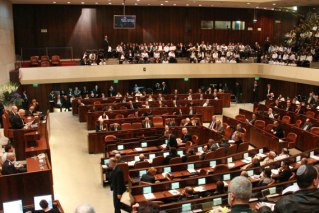 The Knesset plenum, photo by Itzik Edri
The Knesset plenum, photo by Itzik EdriTwo separate bills, two of the unfortunate “stars” of the recent slew of anti-democratic legislation that ACRI has been relentlessly working to prevent, will be brought before the Knesset plenum this evening, 22 March 2011, for a second-third (read: final) vote.
Update: Both bills have been approved in their final reading, and will now be enacted as laws. ACRI: “The Knesset has trampled on basic democratic principles.” ACRI and partners will appeal to the High Court of Justice against the “Acceptance to Communities” law.
These two government-endorsed bills are the “Nakba Law” and the “Acceptance to Communities Bill.” ACRI warns that these bills undermine the most basic democratic principles of equality and freedom of expression.
The Nakba Law: Government Bureaucrats Dictating One Truth
The Nakba Law, officially titled “Budget Principles Law (Amendment 39) – Reducing Budgetary Support for Activities Contrary to the Principles of the State,” will enable a committee of bureaucrats from the Ministry of Finance to fine municipalities, public institutions, or publicly supported organizations – if they believe that these bodies oppose the interpretation of the term “Jewish and democratic State,” express feelings of mourning related to the Israeli Independence Day or the Nakba, or violate the symbols of the State.
Therefore, for example, it will be possible to fine cultural or educational institutions and local municipalities if they hold an event that gives artistic expression (or any other form of expression) to critical or alternative opinions. The actual meaning of this fine is the revocation of public funding, up to ten times the cost of the event in which the “offense” was committed.
Attorney Dan Yakir, ACRI’s Chief Legal Counsel, has sent a letter to Members of Knesset, urging them to oppose the Nakba Law in today’s vote. In his letter, Attorney Yakir states that the law will limit specific forms of expression, while attempting to dictate one ideological and historical truth: “This bill severely damages freedom of political expression, freedom of artistic expression, and freedom of protest, which are all basic rights and are essential to the very existence of a democracy.”
Furthermore, the bill seeks to single out and mark Israel’s Arab citizens as dangerous and disloyal to the State if they seek to express their own narrative and interpretation of historical events. The bill completely ignores the State’s duty to recognize ethnic-national minority groups, their culture, and their narrative, as part of their right to cultural independence. (To read ACRI’s full position on this bill, click here).
Acceptance to Communities Bill: Legally Anchoring Discrimination
The second bill to be brought for a final vote today is the Acceptance to Communities Bill, which will anchor discrimination and separatism in Israeli law by creating acceptance committees to villages of up to 400 family units in the Negev and Galilee regions.
In a legal opinion sent to Members of Knesset, ACRI attorney Gil Gan-Mor noted that in the majority of these communal villages and their expansions, life is not “communal” as it were; and yet the law will enable discrimination in acceptance to these villages based on the vague criteria of “fitting with the life of the community” or “fitting with the social fabric.” Based on these criteria, the committees currently reject “unwanted” communities that wish to live in the village – such as Arabs, single parents, disabled persons, same-sex couples, Mizrachi Jews, religious people, and so on. (To read ACRI’s full position on this bill, click here).
According to Attorney Gil Gan-Mor: “The racist, anti-Arab rhetoric used by some of the promoters of this bill is shameful, but it’s important for the public to understand that any one of us could be targeted by this bill. Israeli legislators are about to sacrifice equality and the right of every person to choose their place of residence – in favor of the extra-rights of the residents of these wealthy communities, who wish to “select” new residents on public lands.
There are currently two standing High Court appeals, submitted by residents who were rejected from such communal villages for “not socially fitting”. These couples are Ahuva and David Kempler, who wanted to live in the expansion of the Kibbutz Maayan Baruch; and Fathna and Ahmad Zbidat, who wanted to live in Rakefet. In the last hearing on this matter at the High Court of Justice, President Dorit Beinisch voiced harsh criticism on these acceptance committees and the intrusive interrogations they perform.
In an unusual step, ACRI has already announced, prior to the bill’s final vote, that if this bill will be approved ACRI, together with members of communal villages who oppose the bill and with the Abraham Fund, will appeal to the HCJ demanding its disqualification.








Pingback: Israel criminalizes commemoration of the Nakba « J. K. D'AMOURS
Pingback: There’s Only Room For One Victim In Palestine, And It Isn’t The Palestinians | Revolt of the Plebs
Pingback: Israel criminalizes commemoration of the Nakba « Red Ant Liberation Army News
Pingback: midthought » Erasing History
Pingback: The ‘Nakba law’ and erasing history
Pingback: Borrando la Historia: La nueva ley israelí sobre la Nakba | Recortes de Oriente Medio
Pingback: Israel outlaws Palestinian memory of the Nakba | SHOAH
Pingback: Borrando la Historia « Recortes de Oriente Medio